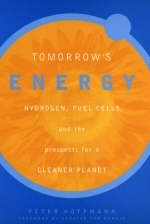
Tomorrow's Energy
Hydrogen, Fuel Cells and the Prospects for a Cleaner Planet
Seiten
2001
MIT Press (Verlag)
978-0-262-08295-2 (ISBN)
MIT Press (Verlag)
978-0-262-08295-2 (ISBN)
- Titel ist leider vergriffen;
keine Neuauflage - Artikel merken
Zu diesem Artikel existiert eine Nachauflage
This title describes research toward a hydrogen-based economy. It presents the history of hydrogen energy and discusses the environmental dangers of continued dependence on fossil fuels.
Hydrogen is the quintessential eco-fuel. This invisible, tasteless gas is the most abundant element in the universe. It is the basic building block and fuel of stars and an essential raw material in innumerable biological and chemical processes. As a completely nonpolluting fuel, it may hold the answer to growing environmental concerns about atmospheric accumulation of carbon dioxide and the resultant Greenhouse Effect. In this book Peter Hoffmann describes current research toward a hydrogen-based economy. He presents the history of hydrogen energy and discusses the environmental dangers of continued dependence on fossil fuels. Hydrogen is not an energy source but a carrier that, like electricity, must be manufactured. Today hydrogen is manufactured by "decarbonizing" fossil fuels. In the future it will be derived from water and solar energy and perhaps from "cleaner" versions of nuclear energy. Because it can be made by a variety of methods, Hoffmann argues, it can be easily adapted by different countries and economies. Hoffmann acknowledges the social, political, and economic difficulties in replacing current energy systems with an entirely new one.
Although the process of converting to a hydrogen-based economy would be complex, he demonstrates that the environmental and health benefits would far outweigh the costs.
Hydrogen is the quintessential eco-fuel. This invisible, tasteless gas is the most abundant element in the universe. It is the basic building block and fuel of stars and an essential raw material in innumerable biological and chemical processes. As a completely nonpolluting fuel, it may hold the answer to growing environmental concerns about atmospheric accumulation of carbon dioxide and the resultant Greenhouse Effect. In this book Peter Hoffmann describes current research toward a hydrogen-based economy. He presents the history of hydrogen energy and discusses the environmental dangers of continued dependence on fossil fuels. Hydrogen is not an energy source but a carrier that, like electricity, must be manufactured. Today hydrogen is manufactured by "decarbonizing" fossil fuels. In the future it will be derived from water and solar energy and perhaps from "cleaner" versions of nuclear energy. Because it can be made by a variety of methods, Hoffmann argues, it can be easily adapted by different countries and economies. Hoffmann acknowledges the social, political, and economic difficulties in replacing current energy systems with an entirely new one.
Although the process of converting to a hydrogen-based economy would be complex, he demonstrates that the environmental and health benefits would far outweigh the costs.
Peter Hoffmann is editor of The Hydrogen & Fuel Cell Letter. He is a former Washington correspondent for McGraw-Hill World News and the author of The Forever Fuel: The Story of Hydrogen.
| Erscheint lt. Verlag | 31.12.2001 |
|---|---|
| Zusatzinfo | 34 |
| Verlagsort | Cambridge, Mass. |
| Sprache | englisch |
| Maße | 152 x 229 mm |
| Gewicht | 649 g |
| Themenwelt | Technik ► Elektrotechnik / Energietechnik |
| Technik ► Umwelttechnik / Biotechnologie | |
| ISBN-10 | 0-262-08295-0 / 0262082950 |
| ISBN-13 | 978-0-262-08295-2 / 9780262082952 |
| Zustand | Neuware |
| Informationen gemäß Produktsicherheitsverordnung (GPSR) | |
| Haben Sie eine Frage zum Produkt? |
Mehr entdecken
aus dem Bereich
aus dem Bereich
Wegweiser für Elektrofachkräfte
Buch | Hardcover (2024)
VDE VERLAG
CHF 67,20
Technologie – Berechnung – Klimaschutz
Buch | Hardcover (2023)
Hanser (Verlag)
CHF 55,95



